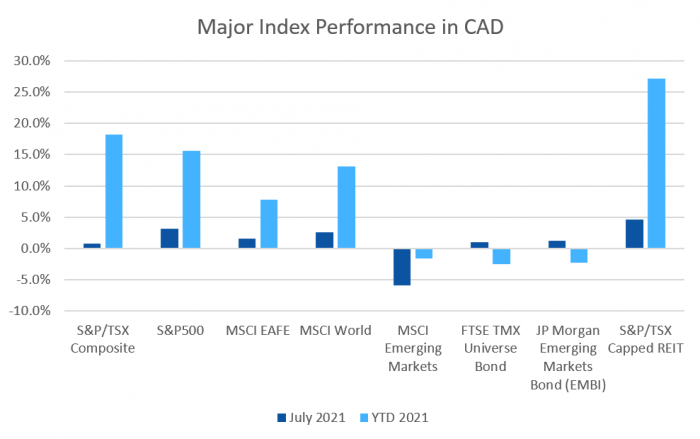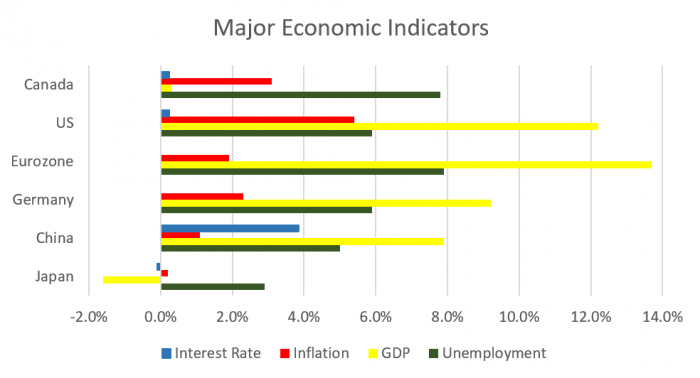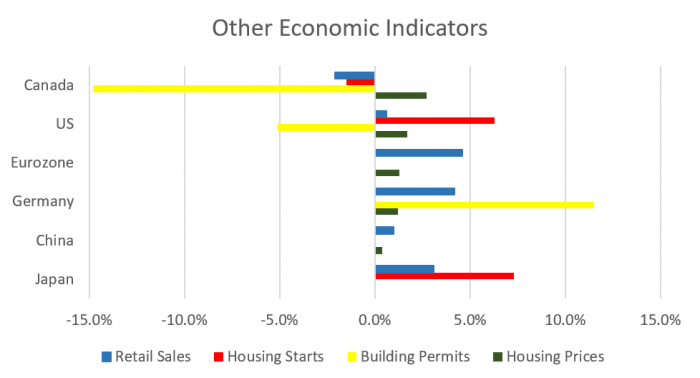July was another good month for the equity markets; REITs were again the stars. Fixed income continued to recover from its first quarter losses.
July 2021 Market Performance
All index returns are total return (includes reinvestment of dividends) and are in Canadian Dollars unless noted.
| Other Market Data | Month-end Value | Return for July 2021 | 2021 YTD Return |
|---|---|---|---|
| Oil Price (USD) | $73.95 | +0.65% | +52.41% |
| Gold Price (USD) | $1,817.20 | +2.57% | -4.11% |
| US 3 month T-bill | +0.06% | +0.01%* | -0.03%* |
| US 10 year Bond | +1.24% | -0.21%* | +0.31%* |
| USD/CAD FX rate | 1.2462 | +0.55% | -2.12% |
| EUR/CAD FX rate | 1.4788 | +0.61% | -5.25% |
| CBOE Volatility Index (VIX) | 18.24 | +15.22% | -19.82% |
*Absolute change in yield, not the return from holding the security.
July was another good month for the equity markets, and REITs were again the stars. Fixed income continued to recover from its first quarter losses.
The S&P/TSX Composite was up +0.8% in July, and hit new all time highs. The TSX Comp. is now up more than +18% for 2021. The S&P/TSX Small Cap was down -2.8% for the month, but is still up +15% for 2021. In the US, the large cap S&P500 was up +2.4% (+18% for 2021) while the small cap Russell 2000 index was down -3.6% for July but remains up +12.7% for 2021. The tech focused Nasdaq was up +1.2% for the month, and is up +13.8% for 2021.
The broad index of EAFE (Europe, Australasia & Far East) stocks was up +0.3% (+11.5% for 2021), European stocks were up +1.4%, and British stocks were flat in July. For 2021 European and British stocks are up +14.3% and +8.9%, respectively. Japanese stocks were again one of the few laggards, declining -4.9%. Emerging market stocks were down -6.4% for the month, erasing all of their gains for 2021.
Bonds were mostly positive in July. The major Canadian bond index, the FTSE/TMX Universe Bond Index, gained +1.0% in July while the FTSE/TMX Short-term Bond Index was up +0.4%. Both are still negative for 2021; -2.5% for the Universe index and -0.1% for the Short-term index. US investment grade bonds also performed well; the ICE BoA AAA and BBB indexes gained +1.6% and +1.2% respectively for the month. High yield was up +0.4% for HY Master II and -0.3% for the CCC and lower (the real junky stuff) Index. Emerging market bonds were up +1.2%, bringing the YTD loss up to -2.5%.
REITs continued to be the stars of 2021, returning more than +4% for the third time this year. The YTD return for the S&P/TSX Capped REIT Index is now +27.1%
After three consecutive months over +5%, oil took a bit of breather in July, gaining +0.6%. For 2021 oil is up +52.4%, probably not a surprise if you’ve had to buy gasoline lately. Gold was up +2.6% for July, bringing the YTD loss up to -4.1%. The diversified Bloomberg Commodities Index gained +1.8% for July and is up +23.4% in 2021.
In July, the Canadian Dollar (CAD) lost -0.5% against the US Dollar and -0.6% against the Euro.
July 2021 Economic Indicator Recap
Below are the readings received in July for the major economic indicators: central bank interest rates, inflation, GDP and unemployment.
Below are the current readings on a few other often followed economic indicators: retail sales and housing market metrics.
A Closer Look at the Canadian Economy
Canada’s unemployment rate dropped to 7.8% in June as most regions began lifting COVID-19 restrictions. The economy gained 230,700 jobs, all of which were part-time jobs; full time employment declined -33,200. Accommodation and food services gained 101,000 jobs, followed by retail with 75,000.
Housing prices across Canada were up +2.7% in June. Gains were led by Ottawa (+4.0%), Hamilton (+3.8%), Victoria (+3.6%) and Halifax (+3.5%). For the fourth consecutive month all 11 major markets were positive.
The level of new housing starts declined -1.5% to 282,100 in June, above forecasts of 270,000. Urban housing starts declined -1.8%, due to a decline of -8.5% in single family home construction. Building permits slumped -14.8 in May to $9.5 billion, not a huge surprise following four months of record highs. Every sector in the index was down; residential permits dropped -16.0% as multifamily building permits dropped -20.6% to $3.3 billion the lowest level since August 2020. Multifamily construction in Ontario accounted for more than half of the overall decline.
The inflation rate for June was +0.3%, and +3.1% on an annual basis. Core inflation which excludes more variable items such as gasoline, natural gas, fruit & vegetables and mortgage interest was +2.7%. The rise in inflation was attributed mostly to gasoline (+32.0%). Excluding gasoline, the inflation index rose +2.2%.
Retail sales were down -2.1% in May. The largest declines occurred at building material and garden equipment stores (-11.3%) and clothing stores (-11.2%). Sales rose +0.8% at food and beverage stores. Compared to a year ago, retail sales were up +24.6%.
Canada’s GDP was down -0.3% in May, the second decline in two months. 12 of 20 industrial sectors declined with construction and retail the largest decliners.
As expected, the Bank of Canada left its benchmark interest rate at 0.25% at the July 14th meeting. The benchmark interest rate is expected to remain at its current low level until into second half of 2022. The BoC reduced its quantitative easing program of purchasing government and corporate bonds to $2 billion per week, down from $3 billion. The next meeting is scheduled for September 8.
*Sources: MSCI, FTSE, Morningstar Direct, Trading Economics



